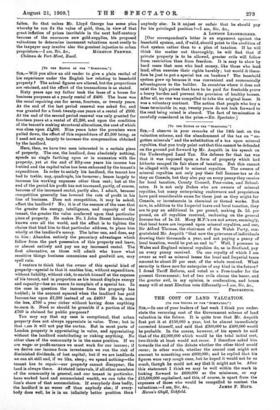[To THE EDITOR OF Till " SPECTATOR... J SIR,—Will you
allow an old reader to give a plain recital of his experience under the English law relating to leasehold property ? The actual figures are altered, but the proportions are retained, and the effect of the transactions is as stated.
Sixty years ago my father took the lease of a house for business purposes at a yearly rental of 2400. The lease was the usual repairing one for seven, fourteen, or twenty years. At the end of the last period renewal was asked for, and was granted for a fresh twenty-one years at a rental of 2800. At the end of the second period renewal was only granted for fourteen years at a rental of £1,200, and upon the condition of -the tenant's making structural alterations, the cost of which was close upon 21.500. Nine years later the premises were pulled down, the effect of this expenditure of 21,500 being, as I need not say, largely to increase the compensation obtained by the landlord.
Here, then, we have two men interested in a certain piece of property. The one, the landlord, does absolutely nothing, spends no single farthing upon or in connexion with the property, yet at the end of fifty-one years his income has trebled and the capital value has been enhanced by the tenant's expenditure. In order to satisfy his landlord, the tenant has had to treble, nay, quadruple, his turnover ; hence largely to increase his working expenses other than rent ; but at the end of the period his profit has not increased, partly, of course, because of the increased rental, partly also, I admit, because competition generally has lowered the rate of profit in his line of business. Does not competition, it may be asked, affect the landlord ? No; it is of the essence of the case that the greater the energy, intelligence, and capacity of the tenant, the greater the value conferred upon that particular piece of property. He makes No. 1 John Street honourably known over all the world, and the effect is to tighten the chains that bind him to that particular address, to place him wholly at the landlord's mercy. The latter can, and does, say to him : Abandon entirely the pecuniary advantages which follow from the part possession of this property and leave, or almost entirely and pay me my increased rental. The first alternative, as those _will admit who know what sensitive things business connexions and goodwill are, may spell ruin.
I venture to think that the owner of this special kind of property—special in that it enables him, without expenditure, without liability, without risk, to enrich himself at the expense of his tenant, and in proportion as his tenant displays energy and capacity—has no reason to complain of a special tax. In the case in question the income from the property has trebled ; is the account squared when the landlord has paid Income-tax upon 21,200 instead of on £400? He is, none the less, 2760 a year richer without having done anything to\ earn it. Need or should he grumble if a portion of this 2760 is claimed for public purposes?
You may say that my case is exceptional, that urban properly does not always appreciate in value. True; but in that case it will not pay the surtax. But in most parts of London property is appreciating in value, and appreciating without the landlord contributing or risking anything. No other class of the community is in the same position. If we are wage- or profit-earners we must work for our income; if we derive our income from investments we run the risk of diminished dividends, of lost capital; but if we are landlords we can sit still and, if we like, sleep ; we spend nothing—the tenant has to repair—our property cannot diaappear, the land is always there. At stated intervals, if all other members of the community in general, and our tenant in particular, have worked bard and accumulated wealth, we can take the lion's share of that accumulation. If everybody does badly, the landlord is no worse off than anybody else; if every- body does well, he is in an infinitely better position than
anybody else.- Is it unjust or unfair that he should pay for his privileged position P—I am, Sir, &c.,
A LONDON LEASEHOLDER.
[Our correspondent's letter is an argument against the leasehold system, and, if valid, should point to the abolition of that system rather than to a plan of taxation. If he will think the matter out thoroughly, he will find that if private property is to be allowed, greater evils will follow from restriction than from freedom. It is easy to show by hard cases that men who lend money, like those who lend land, often exercise their rights harshly ; but would it there- fore be just to put a special tax on bankers ? The leasehold system grew up because it was convenient and economically advantageous to the builder. In countries where it does not exist the high prices that have to be paid for freeholds prove a heavy burden and prevent the provision of healthy houses. After all, no one was compelled to take the original lease. It was a voluntary contract. The notion that people who buy a lease terminable in, say, twenty years do not look forward to the rent being raised is absurd. The fact of termination is carefully considered in the price.—ED. Spectator.]






































 Previous page
Previous page